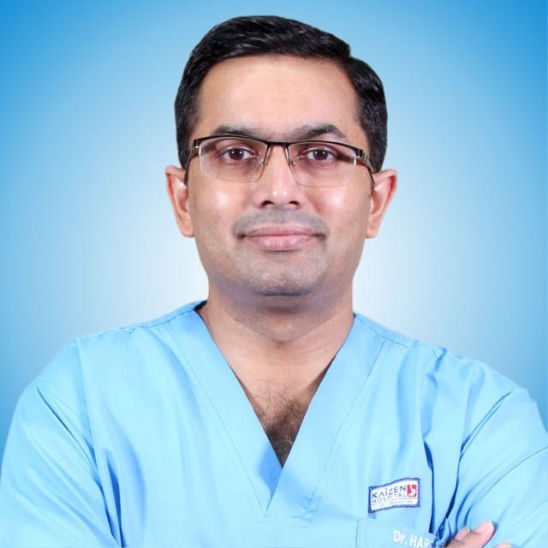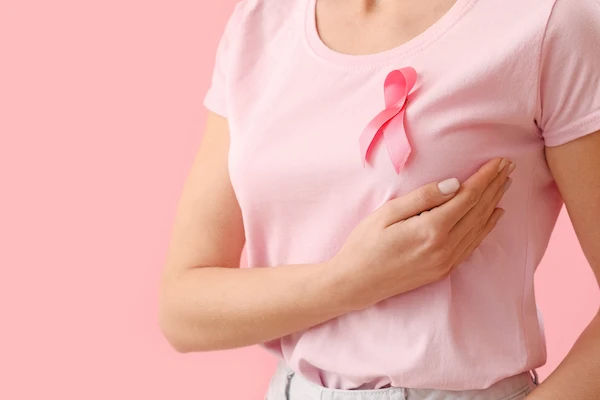Breast Cancer Symptoms and Causes
Understand breast cancer, its common symptoms, and underlying causes. Learn how early detection and awareness can support timely diagnosis and effective treatment.

Written by Dr. J T Hema Pratima
Reviewed by Dr. D Bhanu Prakash MBBS, AFIH, Advanced certificate in critical care medicine, Fellowship in critical care medicine
Last updated on 13th Jan, 2026

Breast cancer is one of the most common cancers affecting women worldwide. While the diagnosis can be overwhelming, early detection and awareness can significantly improve treatment outcomes. This article will help you understand the symptoms, causes, and ways to manage breast cancer in simple, easy-to-understand terms.
What is Breast Cancer?
Breast cancer occurs when cells in the breast grow uncontrollably, forming a tumor. If left untreated, these cancerous cells can spread to other parts of the body. While breast cancer is more common in women, men can also develop it, though it is rare.
Consult a Top Oncologist
Common Symptoms of Breast Cancer
Early detection is key to successful treatment. Here are some signs to watch for:
1. A Lump in the Breast or Armpit – The most common symptom is a painless, hard lump with irregular edges. However, some lumps may be soft or tender.
2. Changes in Breast Shape or Size – One breast may become larger or lower than the other.
3. Skin Changes – Dimpling, redness, or thickening of the skin (like an orange peel).
4. Nipple Changes – Inversion (nipple turning inward), discharge (other than breast milk), or scaling.
5. Pain – While not always present, some women experience persistent pain in the breast or nipple.
Note: Not all lumps are cancerous, but any unusual changes should be checked by a doctor.
What Causes Breast Cancer?
The exact cause of breast cancer is not fully understood, but certain risk factors increase the likelihood of developing it:
Non-Modifiable Risk Factors (Cannot Be Changed)
Age – Risk increases with age, especially after 50.
Gender – Women are at higher risk than men.
Family History – Having close relatives (mother, sister, daughter) with breast cancer increases risk.
Genetic Mutations – Inherited gene changes like BRCA1 and BRCA2.
Early Menstruation or Late Menopause – Longer exposure to estrogen increases risk.
Modifiable Risk Factors (Can Be Controlled)
Obesity – Excess fat tissue increases estrogen levels.
Lack of Physical Activity – Regular exercise helps maintain a healthy weight.
Alcohol Consumption – Drinking alcohol raises risk.
Hormone Replacement Therapy (HRT) – Long-term use of certain hormones may increase risk.
Not Breastfeeding – Breastfeeding lowers risk slightly.
How Breast Cancer Affects Health
If left untreated, breast cancer can spread (metastasize) to other organs like the lungs, liver, bones, or brain. Early-stage breast cancer is often treatable, but advanced stages require more aggressive treatment.
Tips for Prevention and Early Detection
While not all breast cancers can be prevented, these steps can lower your risk:
1. Self-Examination – Check your breasts monthly for any changes.
2. Regular Screenings – Women over 40 should get mammograms as advised by their doctor.
3. Healthy Diet – Eat plenty of fruits, vegetables, and whole grains; limit processed foods.
4. Exercise Regularly – Aim for at least 30 minutes of moderate activity most days.
5. Limit Alcohol – If you drink, do so in moderation.
6. Avoid Smoking – Smoking increases cancer risk.
7. Breastfeed if Possible – It may reduce breast cancer risk.
When to See a Doctor?
If you notice any unusual changes in your breasts, such as a lump, skin changes, or nipple discharge, consult a doctor immediately. Early diagnosis leads to better treatment outcomes.
Book a Consultation or Mammogram with Apollo 24|7
If you have concerns about breast cancer or need a screening, Apollo 24|7 offers easy online consultations and diagnostic tests. Early detection saves lives schedule an appointment today.
Final Thoughts
Breast cancer is a serious condition, but awareness and early action can make a big difference. By knowing the symptoms, understanding risk factors, and adopting a healthy lifestyle, you can take charge of your breast health. If you have any concerns, don’t hesitate to reach out to a healthcare professional.
Consult a Top Oncologist
Consult a Top Oncologist

Dr. Amit Choraria
Surgical Oncologist
18 Years • MBBS, MS (Surgery) Fellow, Surgical Oncology, Tata Medical Center (FSO) Fellow, European Board of Surgery (Surgical Oncology) (FEBS) Fellow, Minimal Access Surgery (FMAS) Fellow, Indian Association of Gastrointestinal Endosurgeons (FIAGES) UICC Fellow, Royal Marsden NHS, London, UK Visiting Scholar, Plastic Reconstructive Surgery, CGMH, Taiwan Fellow, Robotic Surgical Oncology, Vattikuti Foundation, USA
Kolkata
Apollo Multispeciality Hospitals , Kolkata, Kolkata
(75+ Patients)

Dr. Sanchayan Mandal
Medical Oncologist
17 Years • MBBS, DrNB( MEDICAL ONCOLOGY), DNB (RADIOTHERAPY),ECMO. PDCR. ASCO
Kolkata
MCR SUPER SPECIALITY POLY CLINIC & PATHOLOGY, Kolkata

Dr Devashish Tripathi
Radiation Specialist Oncologist
20 Years • MBBS, PLAB, MRCP (UK)- General Medicine, FRCR (Oncology), Certificate of Completion of Training (CCT)- Clinical Oncology
Delhi
Apollo Hospitals Indraprastha, Delhi

Dr. Harsh J Shah
Surgical Oncologist
15 Years • MS, MCh (GI), DrNB (GI)
Ahmedabad
Apollo Hospitals Gandhinagar, Ahmedabad

Dr. Gopal Kumar
Head, Neck and Thyroid Cancer Surgeon
15 Years • MBBS, MS , FARHNS ( Seoul, South Korea ), FGOLF ( MSKCC, New York )
Delhi
Apollo Hospitals Indraprastha, Delhi
(25+ Patients)
_2.webp)


.webp)
